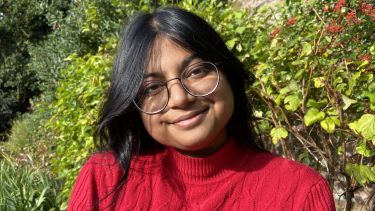Umanga Perera
Postgraduate taught student in the School of Journalism, Media and Communication.

I came to the University in 2016 to pursue a BA (Hons) in Journalism Studies. After graduating in 2019, I continued my studies by undertaking a Masters in International Public and Political Communications.
My background as a Sri Lankan citizen and an expat resident in Qatar has given me insight into the pitfalls of media research in academia. Repeatedly, media professionals would publish works framed by the perspective of western liberal democracies and the political terminology associated with them. This reductionist filter reinforces a western interpretation of the world, leading to inaccurate and sometimes harmful reporting of events. I strongly believe that globalising our outlook on what “normal” is in the realm of media concepts will help both journalists and researchers to portray situations in non-Western societies from a more accurate standpoint.
I tackle this gap in understanding through my dissertation on Sri Lankan expat’s reactions to nationalist propaganda in Qatar. Previously published work mostly attributes nationalism to a feeling only experienced by that country’s citizens. This is not the case in countries like Qatar, UAE, Saudi and Bahrain where there is a supermajority of expats in the population. My research proved that concepts of nationalism can be applied to the country’s immigrant population as well.
My other research interests include self-censorship in Qatar’s local English newsrooms. In the future, I hope to pursue a PhD that compares the treatment of local English news organizations with the country’s flagship media organisation, Al Jazeera. In the meantime, I hope to start a career in either charity communications or media research.
My university experience was influenced by the diversity of students working alongside me. In June 2020, during the peak of the Black Lives Matter movement, I represented the worries of my peers as an Academic Representative and helped establish an advisory council where POC students were paid to help diversify the journalism curriculum. I am grateful that the Department of Journalism has remained an ally to its BAME students and staff by taking the initiative to listen and enact policies that will improve our lived experiences.
Diversity in public spaces is imperative but there is a difference between performative activism and tangible change. Therefore, my hope is that the Department of Journalism’s steps to globalise its curriculum will lead to diversification of the UK's national media as well as the University of Sheffield at large.
Being nominated to be included in the University’s Wall of BAME is but step one. Step two is the university making moves to empower their minority students beyond their courses. The University of Sheffield prides itself as an international organisation and should therefore be taking steps to rectify the gaps in international student employment. This is a tangible way to truly support the students from whom the university is trying to create a more inclusive environment.
